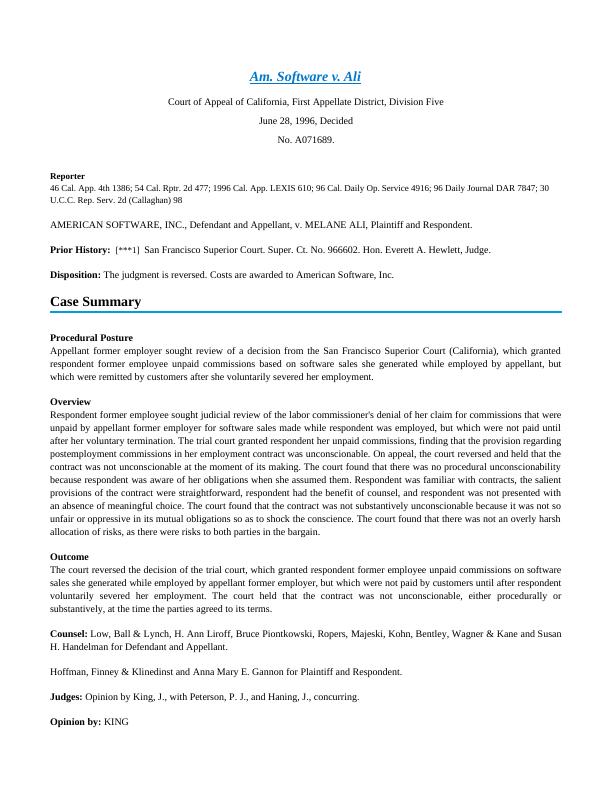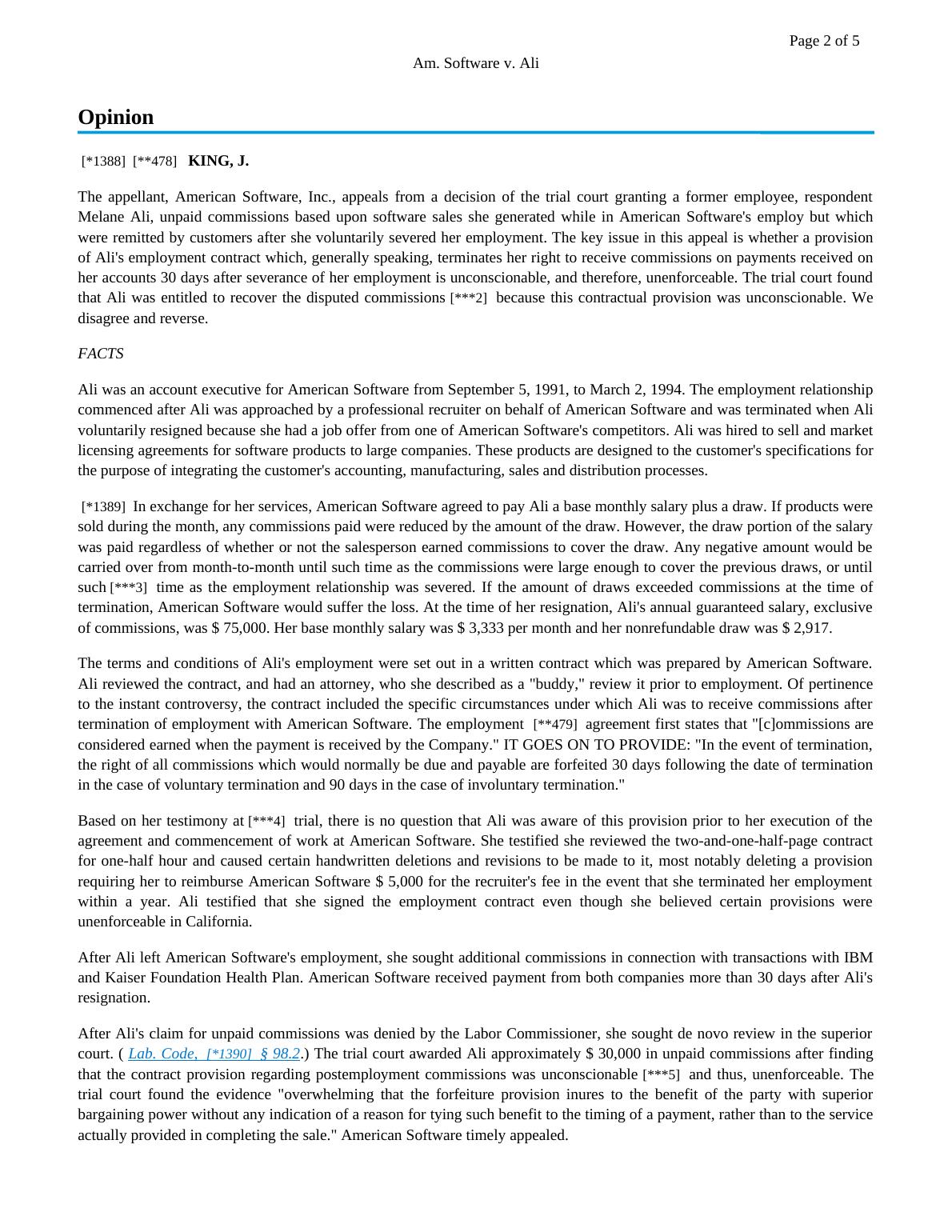Ask a question from expert
Software v. Ali Court of Appeal of California Case Study
5 Pages3897 Words334 Views
Added on 2019-09-16
Software v. Ali Court of Appeal of California Case Study
Added on 2019-09-16
BookmarkShareRelated Documents
Am. Software v. AliCourt of Appeal of California, First Appellate District, Division FiveJune 28, 1996, Decided No. A071689. Reporter46 Cal. App. 4th 1386; 54 Cal. Rptr. 2d 477; 1996 Cal. App. LEXIS 610; 96 Cal. Daily Op. Service 4916; 96 Daily Journal DAR 7847; 30 U.C.C. Rep. Serv. 2d (Callaghan) 98AMERICAN SOFTWARE, INC., Defendant and Appellant, v. MELANE ALI, Plaintiff and Respondent.Prior History:[***1] San Francisco Superior Court. Super. Ct. No. 966602. Hon. Everett A. Hewlett, Judge. Disposition:The judgment is reversed. Costs are awarded to American Software, Inc. Case SummaryProcedural PostureAppellant former employer sought review of a decision from the San Francisco Superior Court (California), which grantedrespondent former employee unpaid commissions based on software sales she generated while employed by appellant, butwhich were remitted by customers after she voluntarily severed her employment.OverviewRespondent former employee sought judicial review of the labor commissioner's denial of her claim for commissions that wereunpaid by appellant former employer for software sales made while respondent was employed, but which were not paid untilafter her voluntary termination. The trial court granted respondent her unpaid commissions, finding that the provision regardingpostemployment commissions in her employment contract was unconscionable. On appeal, the court reversed and held that thecontract was not unconscionable at the moment of its making. The court found that there was no procedural unconscionabilitybecause respondent was aware of her obligations when she assumed them. Respondent was familiar with contracts, the salientprovisions of the contract were straightforward, respondent had the benefit of counsel, and respondent was not presented withan absence of meaningful choice. The court found that the contract was not substantively unconscionable because it was not sounfair or oppressive in its mutual obligations so as to shock the conscience. The court found that there was not an overly harshallocation of risks, as there were risks to both parties in the bargain.OutcomeThe court reversed the decision of the trial court, which granted respondent former employee unpaid commissions on softwaresales she generated while employed by appellant former employer, but which were not paid by customers until after respondentvoluntarily severed her employment. The court held that the contract was not unconscionable, either procedurally orsubstantively, at the time the parties agreed to its terms.Counsel:Low, Ball & Lynch, H. Ann Liroff, Bruce Piontkowski, Ropers, Majeski, Kohn, Bentley, Wagner & Kane and SusanH. Handelman for Defendant and Appellant. Hoffman, Finney & Klinedinst and Anna Mary E. Gannon for Plaintiff and Respondent. Judges:Opinion by King, J., with Peterson, P. J., and Haning, J., concurring. Opinion by:KING

Page 2 of 5Am. Software v. AliOpinion[*1388][**478]KING, J.The appellant, American Software, Inc., appeals from a decision of the trial court granting a former employee, respondentMelane Ali, unpaid commissions based upon software sales she generated while in American Software's employ but whichwere remitted by customers after she voluntarily severed her employment. The key issue in this appeal is whether a provisionof Ali's employment contract which, generally speaking, terminates her right to receive commissions on payments received onher accounts 30 days after severance of her employment is unconscionable, and therefore, unenforceable. The trial court foundthat Ali was entitled to recover the disputed commissions[***2] because this contractual provision was unconscionable. Wedisagree and reverse. FACTSAli was an account executive for American Software from September 5, 1991, to March 2, 1994. The employment relationshipcommenced after Ali was approached by a professional recruiter on behalf of American Software and was terminated when Alivoluntarily resigned because she had a job offer from one of American Software's competitors. Ali was hired to sell and marketlicensing agreements for software products to large companies. These products are designed to the customer's specifications forthe purpose of integrating the customer's accounting, manufacturing, sales and distribution processes. [*1389] In exchange for her services, American Software agreed to pay Ali a base monthly salary plus a draw. If products weresold during the month, any commissions paid were reduced by the amount of the draw. However, the draw portion of the salarywas paid regardless of whether or not the salesperson earned commissions to cover the draw. Any negative amount would becarried over from month-to-month until such time as the commissions were large enough to cover the previous draws, or untilsuch[***3] time as the employment relationship was severed. If the amount of draws exceeded commissions at the time oftermination, American Software would suffer the loss. At the time of her resignation, Ali's annual guaranteed salary, exclusiveof commissions, was $ 75,000. Her base monthly salary was $ 3,333 per month and her nonrefundable draw was $ 2,917. The terms and conditions of Ali's employment were set out in a written contract which was prepared by American Software.Ali reviewed the contract, and had an attorney, who she described as a "buddy," review it prior to employment. Of pertinenceto the instant controversy, the contract included the specific circumstances under which Ali was to receive commissions aftertermination of employment with American Software. The employment [**479] agreement first states that "[c]ommissions areconsidered earned when the payment is received by the Company." IT GOES ON TO PROVIDE: "In the event of termination,the right of all commissions which would normally be due and payable are forfeited 30 days following the date of terminationin the case of voluntary termination and 90 days in the case of involuntary termination." Based on her testimony at[***4] trial, there is no question that Ali was aware of this provision prior to her execution of theagreement and commencement of work at American Software. She testified she reviewed the two-and-one-half-page contractfor one-half hour and caused certain handwritten deletions and revisions to be made to it, most notably deleting a provisionrequiring her to reimburse American Software $ 5,000 for the recruiter's fee in the event that she terminated her employmentwithin a year. Ali testified that she signed the employment contract even though she believed certain provisions wereunenforceable in California. After Ali left American Software's employment, she sought additional commissions in connection with transactions with IBMand Kaiser Foundation Health Plan. American Software received payment from both companies more than 30 days after Ali'sresignation. After Ali's claim for unpaid commissions was denied by the Labor Commissioner, she sought de novo review in the superiorcourt. ( Lab. Code, [*1390] § 98.2.) The trial court awarded Ali approximately $ 30,000 in unpaid commissions after findingthat the contract provision regarding postemployment commissions was unconscionable[***5] and thus, unenforceable. Thetrial court found the evidence "overwhelming that the forfeiture provision inures to the benefit of the party with superiorbargaining power without any indication of a reason for tying such benefit to the timing of a payment, rather than to the serviceactually provided in completing the sale." American Software timely appealed. DISCUSSION

End of preview
Want to access all the pages? Upload your documents or become a member.
Related Documents
Ellis v. McKinnon Broadcasting Co. - Court of Appeal of California Case Summarylg...
|6
|4166
|269